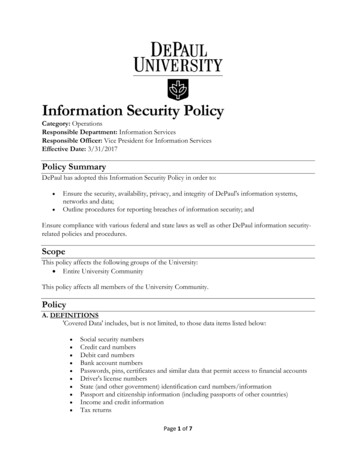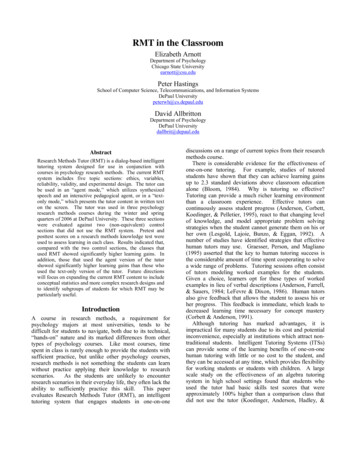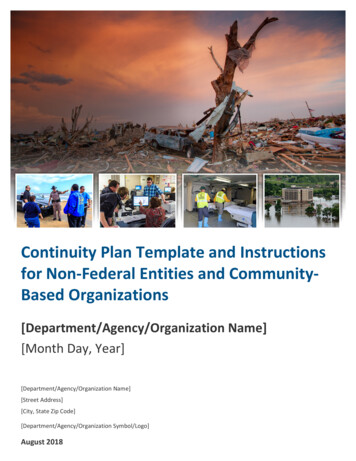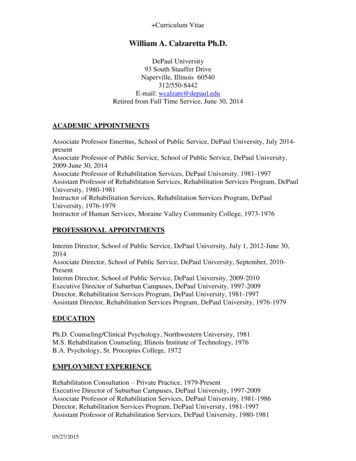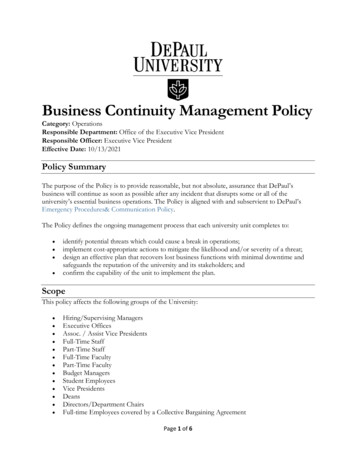
Transcription
Business Continuity Management PolicyCategory: OperationsResponsible Department: Office of the Executive Vice PresidentResponsible Officer: Executive Vice PresidentEffective Date: 10/13/2021Policy SummaryThe purpose of the Policy is to provide reasonable, but not absolute, assurance that DePaul’sbusiness will continue as soon as possible after any incident that disrupts some or all of theuniversity’s essential business operations. The Policy is aligned with and subservient to DePaul’sEmergency Procedures& Communication Policy.The Policy defines the ongoing management process that each university unit completes to: identify potential threats which could cause a break in operations;implement cost-appropriate actions to mitigate the likelihood and/or severity of a threat;design an effective plan that recovers lost business functions with minimal downtime andsafeguards the reputation of the university and its stakeholders; andconfirm the capability of the unit to implement the plan.ScopeThis policy affects the following groups of the University: Hiring/Supervising ManagersExecutive OfficesAssoc. / Assist Vice PresidentsFull-Time StaffPart-Time StaffFull-Time FacultyPart-Time FacultyBudget ManagersStudent EmployeesVice PresidentsDeansDirectors/Department ChairsFull-time Employees covered by a Collective Bargaining AgreementPage 1 of 6
Temporary StaffAcademic and Administrative Officers are responsible for ensuring compliance with the Policythroughout their respective units and for completing the actions prescribed by the Policy. ExecutiveOfficers are responsible for ensuring compliance with the Policy in their respective offices and fortheir leadership roles and completing the actions prescribed by the Policy.All employees of DePaul University are required to be aware of their unit’s business continuityplans, their individual responsibilities if a plan were invoked, and how to access the resources- including other employees, information, and/or materials - needed to carry out theirresponsibilities.Out of the scope of this policy are: Emergency response plans (defined by the Emergency Procedures and CommunicationsPolicy),Crisis management and crisis communications plans, andDisaster recovery plans (developed by Information Systems and Facility Operations).PolicyAny number of incidents - from minor equipment malfunctions to life-threatening emergencies suchas natural disasters or malicious attacks - can disrupt DePaul’s normal activities and essentialbusiness functions. Effective incident response protocols may permit the organization to minimizean incident’s adverse effects on the safety and welfare of individuals and property; restore criticaloperations; manage communications and protect the university’s reputation and assets; and expeditethe return to normal activities and operations.This policy is aligned with and subservient to DePaul’s Emergency Procedures and Communications Policyand the DePaul University Emergency Operations Plan: Loop and Lincoln Park Campuses. As defined bythese documents, each unit will develop emergency information appropriate for the characteristicsof their unit.The focus of this policy is business continuity management. This policy defines the ongoingmanagement process and procedures that each unit follows to: identify and prioritize essential business functionsidentify potential threats which could cause a break in their operations;implement cost-appropriate actions to mitigate the likelihood and/or severity of threats;design an effective Business Continuity Plan (BCP) that defines strategies to restore lostbusiness functions with minimal downtime and efficiently return to normal operations; andconfirm the capability of the unit to implement the plan.Academic and Administrative Officers are responsible for their unit’s compliance with the policy.Executive Officers are likewise responsible for ensuring compliance with the Policy in theirrespective offices and for their leadership roles in supporting university completion of the actionsprescribed by the Policy. Academic and Administrative Officers have the responsibility to addressPage 2 of 6
business continuity management for their unit as a whole. They also are responsible for ensuringthat subunits complete the process for their essential business functions.Execution of the Business Management Process and all outcomes of the process must comply withall DePaul policies. This includes but is not limited to: Faculty inclusion in all steps in the process as specified by faculty governance in the FacultyHandbook, andAmending existing policies that require provisions for specific recovery situations.The tangible outcome of complying with the policy is the development, approval, storage, andongoing maintenance of a BCP. The unit’s Academic or Administrative Officer documents theirapproval on the first page of the BCP with the name and title of the Officer and the approval date.Once the Academic or Administrative Officer approves a unit’s BCP, the unit must regularly reviewand update the plan, train faculty and staff and exercise portions of the plan: Annually review each BCP to check that it is up-to-date and complete. The unit’s Academicor Administrative Officer must approve each update to the BCP, with the name of approverand date documented on the first page of the BCP.Annually update faculty and staff on changes to the BCP and refresh their understanding ofthe plan. Annually train new faculty and staff on the plan. Training is confirmed byemployees during a Quality Assurance Review.Every two years a unit must exercise a portion of the plan using a table-top exercise or drill.Document and retain an exercise assessment that summarizes the result of the exercise andinforms future BCP updates.ProceduresREPOSITORY FOR UNIT BUSINESS CONTINUITY MATERIALSAll unit materials supporting Business Continuity Management must be stored in a repository thatensures reliable and timely access in the event of a disruption. Since BCPs may contain informationabout DePaul’s internal business processes that is confidential in nature the repository must alsohave access control. Information Services supports two repositories with these features. Eachrepository requires a Campus Connect logon. The decision of which repository to use resided in theunit executing the process. The options are: DePaul Knowledgebase wiki: https://knowledge.depaul.edu Business continuity relateddocuments stored in the DePaul Knowledgebase should be in a space named “BusinessContinuity Plan - unit name .”DePaul OneDrive: eshanah2 depaul edu/Egn9n42g MhAo9XgIFjhZ0Bo1xXurzyjVxDZP-R2Jo0kg Business continuity related documents stored in OneDriveshould be in a folder named “Business Continuity Plan - unit name .”Each repository also contains resources for executing the Business Continuity Management processincluding templates for accessing, creating, storing and maintaining BCPs; background on businessPage 3 of 6
continuity management; and materials to support employee training and plan testing. The resourcesare posted in: For DePaul Knowledgebase ness Continuity Management Resources HomeFor OneDrive: eshanah2 depaul edu/Egn9n42g MhAo9XgIFjhZ0Bo1xXurzyjVxDZP-R2Jo0kg.BUSINESS CONTINUITY MANAGEMENT PROCESSUnits must complete a six-step process and annually review each step to ensure currency of plansand the unit’s ability to execute the plans. Faculty and/or staff responsible for essential businessfunctions of their unit must be engaged in all steps in the process:1. Conduct a Business Impact Assessment (BIA): Analyze the unit’s work flows to: Prioritize the unit’s business functions.Identify, document, and communicate interdependencies with other units or amongfunctions within a unit.Document contractual, regulatory and legal requirements for the business functions.Establish maximum allowable downtime and recovery time objectives (RTOs) for eachfunction.Establish acceptable level of losses and recovery point objectives (RPOs), defining thepoint that a process will be restarted.Identify the critical paths and dependencies for restoring a prioritized business function.The outcome of the BIA is a prioritized listing of the key business functions in theunit This listing is retained in the DePaul Knowledgebase with the unit’s business continuitymaterials.2. Conduct a Risk Assessment: Numerous natural disasters, technical disruptions or humaninitiated incidents can affect the ability of a unit to deliver normal business functions. Eachunit shall determine which risks have the greatest likelihood of occurrence and/or mostseverity of impact on the unit. These risks are reviewed to identify common effects, such aspersonnel are unable to perform functions, facilities are not available or information access isdisrupted.The outcome of the Risk Assessment is a listing of the risks highlighted and the impacts theunit reasonably foresees encountering. This listing is retained in the DePaul Knowledgebasewith the unit’s business continuity materials.3. Develop Risk Reduction Strategies: Based on the risk assessment, the unit will considerpreemptive options for decreasing the likelihood of occurrence and/or decreasing theseverity of the impact if an incident occurs.The outcome is an action plan for implementing practical strategies.Page 4 of 6
4. Develop a Business Continuity Plan: Based on the risk assessment findings and business impactanalysis, develop plans for the unit’s response and recovery of essential business functionsfor the risks that are most likely and/or most severe. A BCP template is provided.The BCP includes:o the essential functions performed by a unit and the order for restoring thesefunctions, recognizing the prioritization among functions, time demands forfunctions, critical paths within functions, and outside dependencies;o succession plans for individuals in leadership role or with specialized expertise;o alternatives for needed facilities, equipment, or supplies; ando a collection of procedures and work instructions.All BCPs must be compliant with DePaul’s policies. If the planning process identifiesresponse situations that would be non-compliant with an existing policy, amend the affectedpolicy to incorporate provisions for disruptions.The outcome is a BCP, approved by the unit’s Academic or Administrative Officer andstored in the DePaul Knowledgebase with all accompanying documentation.5. Training and Communications: All employees shall receive communications on the existence ofand location of their unit’s BCP. All employees who would have new or expanded roles ifthe BCP were invoked shall receive training appropriate for their additional responsibilities.The objective is thato all faculty and staff are aware of the BCP and how to access the plano all faculty and staff who have a role during a recovery have participated in at leastone BCP training session. Employees confirm training during a Quality AssuranceReview.6. Evaluate the Plan’s Effectiveness: Every two years each unit shall conduct a tabletop exercisesimulating a specific disruption. This exercise will serve as a practice for faculty and staffwho must implement the plan and confirm that the robustness of the plan for that incident.The outcome is a summary statement of the exercise, and if appropriate, an action plan thatidentifies updates for the BCP or modifications to training. This document is presentedduring a Quality Assurance Review and retained in the DePaul Knowledgebase with theunit’s business continuity materials.Divisional CollaborationsCollaborations include: DePaul Public Safety, particularly the Assistant Director Emergency Management and theAssociate Director Emergency Management;Information Services, particularly the Director of Infrastructure and the Director ofInformation Security; andPage 5 of 6
Compliance and Risk Management.Contact InformationOffice of the Executive Vice ground information, including the DePaul Business Continuity Management Overview and theBusiness Continuity Plan Template is located in the DePaul Knowledgebase.History/RevisionsOrigination Date: 12/06/2017Last Amended Date: 10/13/2021Next Review Date: N/APage 6 of 6
Business Continuity Plan Template is located in the . DePaul Knowledgebase. History/Revisions Origination Date: 12/06/2017 Last Amended Date: 10/13/2021 Next Review Date: N/A . Title: Business Continuity Management Policy Author: DePaul University Created Date:
